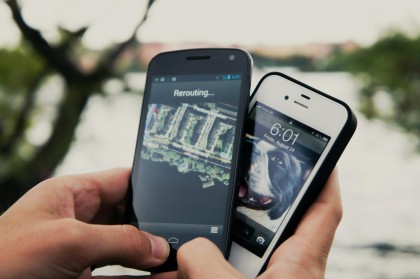Note: This article first appeared in The Loop Magazine Issue 17.
867-5309. 911. And… that’s about it. Those two seemingly random strings of digits just so happen to be phone numbers.
One is the emergency line for U.S. citizens, established as a public service to be rung in times of utter distress. The other is best known for being the hook in a Tommy Tutone jam. For all of the technologies that have come, served their time, and went, the antediluvian phone number remains—clinging to life much like a zombie that refuses to remain planted in its grave. Unlike Sony’s MiniDisc, SanDisk’s slotRadio, and Palm’s webOS, the phone number has few meaningful supporters. In fact, it’s easily one of the most complicated and frustrating beacons of communication in the world today, but it’s hanging on for one primary reason: ubiquity.
As they say, old habits die hard, and well-rooted trees require the most effort to poison. The telephone number has served us well. Despite the need for country codes, phone numbers are generally universal, and can be used to connect humans in faraway lands (assuming they’re kosher with the roaming rates, which I’ll touch on in a bit). It’s a protocol that’s supported by every single phone, from dirt cheap to obscenely expensive, and it’s the only number that you can give someone without any doubt that they’ll understand how to use it to contact you. But let’s be honest: the phone number has done absolutely nothing for you lately.

In fact, it’s probably causing you all sorts of grief. What was once a universally accepted standard now feels tremendously limited. For starters, dialing any number outside of your own country involves fees—fees which seem thoroughly absurd in an age where the internet has enabled limitless communication without borders. The cost of making a simplistic voice call has been driven to zero by the likes of Google Voice, Skype, Apple’s FaceTime Audio, Facebook, Viber, and countless others. Even outfits notorious for bilking customers for all that they’re worth (yes, I’m looking your way, mobile carriers of the United States) have given up on the scheme—these days, you get unlimited calling if you pony up for a data plan.
The mere notion of paying to call someone now seems ludicrous. And yet, the phone number lives on.
The upside is that we’re making progress. Facebook’s own Messenger app is slowly but surely becoming one that’ll enable non-Facebook users to input a phone number and forget it, forever using a converted identifier and whatever data connection you can find in order to pass along snippets of text. I’d surmise that voice conversations won’t be far behind. The downside is that the default action for consumers—even technophiles such as myself—is to pass along one’s phone number first, followed by far more fluid tokens such as an email address, a Twitter handle, or a Facebook username. If ever we hope to fully kill the phone number, we’re going to have to make a concerted effort as a society to stop relying on it first and foremost.

My proposal is a simple one from a conceptual standpoint, but one that faces huge challenges due to the monolithic corporations who hold the power to make the necessary changes. When 5G (or whatever happens after LTE) is fully in place, there’s really no reason to not build the networks to transmit all voice calls over data. Today’s networks may not be fully capable of handling every single voice call in VoIP fashion, but bandwidth is going to be far less of an issue once LTE has been eclipsed. It’s already possible for me to ring a conventional phone number from my web browser thanks to a Google Voice plug-in; as far as the receiver of that call knows, I’m calling from a landline. Then also remember that you can use a virtual number for Whatsapp (see https://www.yourbusinessnumber.com/blog/how-can-i-get-a-virtual-number-for-whatsapp for more details) and that allows you to use two numbers on the one phone, so that can be very useful indeed for many users. The technology is already here, but unless mobile operators and network infrastructure outfits jointly decide to make the leap to VoIP for everything, we’re going to remain shackled to an ancient technology.
It doesn’t take an argonaut to understand the benefits of using a different identifier and an internet-based calling platform. Today, a U.S. citizen that travels to England can buy a SIM card in a vending machine upon landing, load it up with data, and effectively use their smartphone exactly as they would in the United States… save for the whole “calling and texting” thing. When you swap the SIM out, your phone number goes dead for the duration of your trip. But why? That new SIM is fully capable of channeling voice calls to your phone via data networks—the only thing we need is implementation.

Why shouldn’t you be able to complete a call using any device tethered to a data connection? A laptop or tablet with a set of headphones seems like a perfectly acceptable way to communicate, but as it stands, the phone number won’t have any of it.
Out society is too large, and far too set in their ways, for anyone to expect the masses to take meaningful action to change our dependence on the traditional phone number. But if we try, we might be able to pressure mobile carriers into considering a VoIP future that at least enables numbers to be ported amongst data-enabled devices.
As with practically everything related to the expansion of internet availability, one shouldn’t underestimate the economic impact that such a change could have. Roaming charges are hurdles for even the affluent amongst us; in a developing nation, they’re outright insurmountable. The thought of a world where every phone could call another, anywhere in the world, using a data network that pays no mind to long distance fees—that’s a thought that thrills me.
Darren Murph Bio:
Darren has roamed the consumer electronics landscape for nearly a decade, most recently serving as Engadget’s Managing Editor and now as SVP of Editorial Strategy for Weber Shandwick. He owns a Guinness World Record as the planet’s most prolific professional blogger, and believes that there’s no such thing as too much travel.
